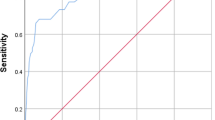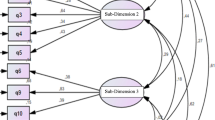Abstract
Objective
This preliminary pilot study aims to explore the use of the Feeding Practices and Structure Questionnaire (FPSQ) and Children’s Eating Behaviour Question (CEBQ) in a sample of Vietnamese mothers.
Subjects/methods
Cross-sectional data from the FPSQ and CEBQ were collected from a convenience sample of mothers (n = 102) who attended the Ho Chi Minh City Nutrition Centre in Viet Nam. Mothers had at least one child aged 2–5 years. The reliability of the questionnaire subscales was tested using Cronbach’s alpha coefficients. Face validity was assessed using dialogue from a translation-back-translation procedure undertaken by an expert committee, and cognitive interviews conducted in a subsample of mothers (n = 6). Based on these findings, exploratory factor analyses (EFAs) were performed to assess the underlying structures of both questionnaires in this sample.
Results
Cronbach’s alpha coefficients for the original questionnaires ranged from 0.23 to 0.92. Limitations in translation and comprehension of items surfaced, warranting modifications of the questionnaires, which were subsequently examined using EFA. EFA of the FPSQ and CEBQ revealed a six-factor structure with 23 items, and a six-factor structure with 27 items, respectively, which were interpretable solutions for this sample. Cronbach’s alpha coefficients were >0.70 for all subscales in the revised questionnaires.
Conclusions
Modified versions of the FPSQ and CEBQ are proposed for use in Viet Nam. However, prior to their use, further reliability and validity testing must be undertaken in larger samples, including assessment of test–retest reliability and construct validity, as well as confirmatory factor analysis to verify the proposed factor structures.
This is a preview of subscription content, access via your institution
Access options
Subscribe to this journal
Receive 12 print issues and online access
$259.00 per year
only $21.58 per issue
Buy this article
- Purchase on Springer Link
- Instant access to full article PDF
Prices may be subject to local taxes which are calculated during checkout
Similar content being viewed by others
References
Ramachandran A, Chamukuttan S, Shetty SA, Arun N, Susairaj P. Obesity in Asia—is it different from rest of the world. Diabetes Metab Res Rev. 2012;28:47–51.
Ng M, Fleming T, Robinson M, Thomson B, Graetz N, Margono C, et al. Global, regional, and national prevalence of overweight and obesity in children and adults during 1980–2013: a systematic analysis for the Global Burden of Disease Study 2013. Lancet. 2014;384:766–81.
World Health Organization. Global database on child growth and malnutrition. 2018. Available from: http://www.who.int/nutgrowthdb/en/.
To QG, Gallegos D, Do DV, Tran HTM, To KG, Wharton L, et al. The level and pattern of physical activity among fifth-grade students in Ho Chi Minh City, Vietnam. Public Health. 2018;160:18–25.
Black RE, Victora CG, Walker SP, Bhutta ZA, Christian P, de Onis M, et al. Maternal and child undernutrition and overweight in low-income and middle-income countries. Lancet. 2013;382:427–51.
Reilly JJ, Kelly J. Long-term impact of overweight and obesity in childhood and adolescence on morbidity and premature mortality in adulthood: Systematic review. Int J Obes. 2011;35:891–8.
Anzman SL, Rollins BY, Birch LL. Parental influence on children’s early eating environments and obesity risk: implications for prevention. Int J Obes. 2010;34:1116–24.
Jansen E, Mallan KM, Nicholson JM, Daniels LA. The Feeding Practices and Structure Questionnaire: construction and initial validation in a sample of Australian first-time mothers and their 2-year olds. Int J Behav Nutr Phys Act. 2014;11:72.
Ngan HTD, Tuyen LD, Phu PV, Nambiar S. Childhood overweight and obesity amongst primary school children in Hai Phong City, Vietnam. Asia Pac J Clin Nutr. 2018;27:399–405.
Jansen E, Williams KE, Mallan KM, Nicholson JM, Daniels LA. The Feeding Practices and Structure Questionnaire (FPSQ-28): a parsimonious version validated for longitudinal use from 2 to 5 years. Appetite. 2016;100:172–80.
Wardle J, Guthrie CA, Sanderson S, Rapoport L. Development of the Children’s Eating Behaviour Questionnaire. J Child Psychol Psychiatry. 2001;42:963–70.
Mallan KM, Liu W-H, Mehta RJ, Daniels LA, Magarey A, Battistutta D. Maternal report of young children’s eating styles. Validation of the Children’s Eating Behaviour Questionnaire in three ethnically diverse Australian samples. Appetite. 2013;64:48–55.
Cao Y-T, Svensson V, Marcus C, Zhang J, Zhang J-D, Sobko T. Eating behaviour patterns in Chinese children aged 12–18 months and association with relative weight—factorial validation of the Children’s Eating Behaviour Questionnaire. Int J Behav Nutr Phys Act. 2012;9:5.
Quah PL, Cheung YB, Pang WW, Toh JY, Saw S-M, Godfrey KM, et al. Validation of the Children’s Eating Behavior Questionnaire in 3 year old children of a multi-ethnic Asian population: the GUSTO Cohort Study. Appetite. 2017;113:100–5.
Purwaningrum DN, Arcot J, Hadi H, Hasnawati RA, Rahmita RS, Jayasuriya R. A cultural adaptation and validation of a child eating behaviour measure in a low- and middle-income country. Public Health Nutr. 2020;23:1931–8.
Loh DA, Moy FM, Zaharan NL, Mohamed Z. Eating behaviour among multi-ethnic adolescents in a middle-income country as measured by the self-reported Children’s Eating Behaviour Questionnaire. PLoS ONE. 2013;8:e82885.
Quah PL, Fries LR, Chan MJ, Fogel A, McCrickerd K, Goh AT, et al. Validation of the Children’s Eating Behavior Questionnaire in 5 and 6 year-old children: the GUSTO Cohort Study. Front Psychol. 2019;10:824.
Beaton DE, Bombardier C, Guillemin F, Ferraz MB. Guidelines for the process of cross-cultural adaptation of self-report measures. Spine (Philos Pa 1976). 2000;25:3186–91.
Hardesty DM, Bearden WO. The use of expert judges in scale development: Implications for improving face validity of measures of unobservable constructs. J Bus Res. 2004;57:98–107.
Tourangeau R. Cognitive sciences and survey methods. In: Jabine T, Straf M, Tanur J, Tourangeau R, editors. Cognitive aspects of survey methodology: building a bridge between disciplines. Washington DC: National Academy Press; 1984. p. 73–100.
IMB Corp. SPSS Statistics for Windows. 25 ed. Armonk, NY: IBM Corp.; 2017.
Johnson AM. Reliability, Cronbach’s alpha. In: Allen M, editor. The SAGE encyclopedia of communication research methods. Thousand Oaks: SAGE Publications; 2018. p. 1415–17.
Do LM, Eriksson B, Tran TK, Petzold M, Ascher H. Feeding of preschool children in Vietnam: a study of parents’ practices and associated factors. BMC Nutr. 2015;1:1–10.
Steels SL. The EURO-URHIS 2 project in Ho Chi Min City: contextual adequacy in cross-cultural research. Health Promot Int. 2016;31:242–8.
Sirirassamee T, Hunchangsith P. Children’s Eating Behavior Questionnaire: factorial validation and differences in sex and educational level in Thai school-age children. Southeast Asian J Trop Med Public Health. 2016;47:1325–34.
Birch L, Fisher J, Grimm-Thomas K, Markey C, Sawyer R, Johnson S. Confirmatory factor analysis of the Child Feeding Questionnaire: a measure of parental attitudes, beliefs and practices about child feeding and obesity proneness. Appetite. 2001;36:201–10.
Yang WY, Burrows T, MacDonald-Wicks L, Williams LT, Collins CE, Chee WSS. Parent-child feeding practices in a developing country: findings from the Family Diet Study. Appetite. 2018;125:90–7.
Noor AM, Leelavathi M, Shamsul AS, Hizlinda T, Khairani O, Fatimah A. Parental concerns and control in feeding of 9 to 12-year-old children in a primary school in Kuala Lumpur, Malaysia. Malays J Nutr. 2012;18:47–55.
Thongbai W, Fongkaew W, Kennedy CM, Aree P, Patumanond J. Risk factors contributing to overweight among preschool children. Pac Rim Int J Nurs Res. 2011;15:13–27.
Hien NN, Kam S. Nutritional status and the characteristics related to malnutrition in children under five years of age in Nghean, Vietnam. J Prev Med Public Health. 2008;41:232–40.
Arvey R, Dhanaraj C, Javidan M, Zhang Z-X. Are there unique leadership models in Asia? Exploring uncharted territory. Leadersh Q. 2015;26:1–6.
Niemeier BS, Duan YP, Shang BR, Yang J. Parental influences on weight-related health behaviors in western and eastern cultures. Child Care Health Dev. 2017;43:259–66.
Acknowledgements
The authors would like to acknowledge QUT in Australia and the HCMC Nutrition Centre in Viet Nam for providing resources for data collection. They would also like to extend their appreciation to staff at the HCMC Nutrition Centre and students at the University of Medicine and Pharmacy in HCMC who assisted with data collection. Finally, the authors would like to thank mothers who dedicated time to participating in this study.
Funding
This research was supported by the Australian Government under the New Colombo Plan (Reference: 15804). The Australian Government was not involved in this research.
Author information
Authors and Affiliations
Contributions
Data collection was undertaken by SA, CQT, and DND, and data analyses were conducted by SA and EJ. The manuscript was written by SA and revised by DG, SN, and EJ.
Corresponding author
Ethics declarations
Conflict of interest
DG is currently funded by the Queensland Children’s Hospital Foundation with a philanthropic grant from Woolworths. Both organisations were not involved in this research.
Additional information
Publisher’s note Springer Nature remains neutral with regard to jurisdictional claims in published maps and institutional affiliations.
Supplementary information
Rights and permissions
About this article
Cite this article
Ayre, S., Gallegos, D., Nambiar, S. et al. Preliminary exploration of the use of the Children’s Eating Behaviour Questionnaire (CEBQ) and Feeding Practices and Structure Questionnaire (FPSQ) in Vietnamese mothers. Eur J Clin Nutr 76, 442–449 (2022). https://doi.org/10.1038/s41430-021-00947-w
Received:
Revised:
Accepted:
Published:
Issue Date:
DOI: https://doi.org/10.1038/s41430-021-00947-w
This article is cited by
-
Children’s eating behaviours and related constructs: conceptual and theoretical foundations and their implications
International Journal of Behavioral Nutrition and Physical Activity (2023)



